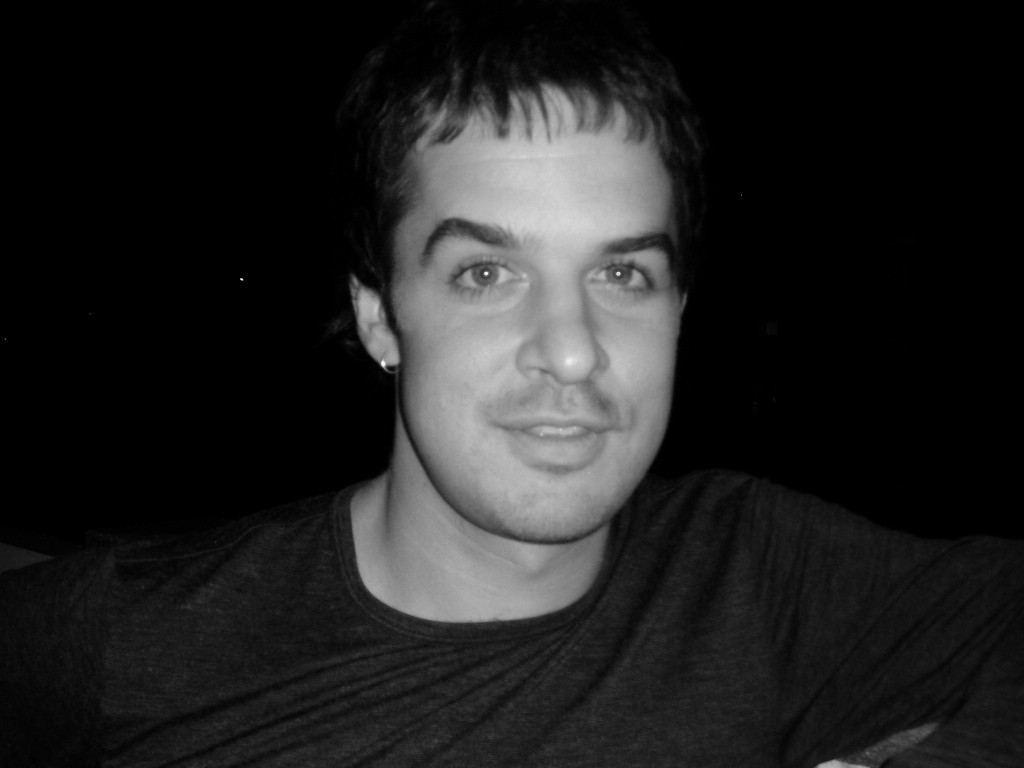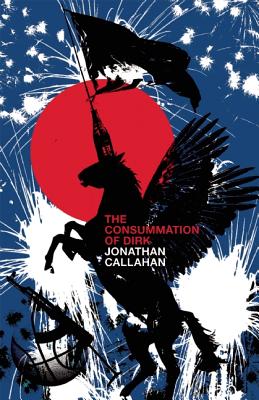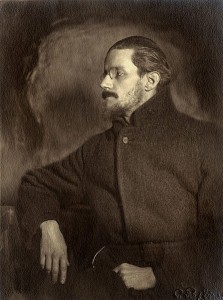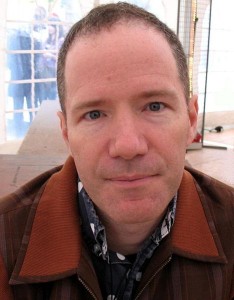
I have never met Jonathan Callahan. I don’t know what he looks like, or where he lives, and whether or not he likes his parents, or even if he has parents. I can’t exactly remember, in fact, how I began corresponding with him, excepting that I remember a friend of mine was guest editing a certain literary magazine, and this happened to coincide with Jonathan Callahan sending me a story he’d written. Many people do this to me, often without asking first, and normally I am irritable as a result, and don’t end up paying close attention to these stories. In this case, I paid enough attention to realize that the story was remarkably good. I passed the story on to my friend editing the literary magazine. Subsequently, Jonathan Callahan wrote a not entirely flattering assessment of my work, and then named a character after me in his book, a character who was not entirely likable. You’d think I would have learned my lesson. However, Jonathan Callahan, in his thorny, slightly self-destructive way, turns out to be a truth teller of the old variety. He’s the best contemporary example of that guy who refuses to stop worrying about Zeno’s Paradox, that guy who actually spent some time mapping out the structure of Beyond Good and Evil, that guy who knows all about the river names in Finnegans Wake. He can also tell you anything about basketball, anything at all. (It is possible, therefore, that he is tall.) In the end, my requirement for literature is that it harbor some deep engagement with the verifiable complexities of human consciousness. Almost all books, in my estimation, fail at this engagement. Jonathan Callahan, who feels he is doomed sometimes, who can’t keep his shit together exactly, spins out this deep engagement as though it were easy, or natural to him. That means: he has lots and lots of talent. Which is why I keep talking to him, and why we did this interview that I didn’t really have time to do.
Part I of Interview:
Rick Moody: So where did your book come from? What makes you think you’re allowed to be this kind of writer, instead of, e.g., some more conventional writer?
Jonathan Callahan: Instinct is to send the second part of this question back over the net and ask for much more clearly defined terms, for instance:
1. What “kind of writer” do I appear to be trying to be here?
2. Even if the term “conventional” as applied to literary fiction did ever accurately describe some middlebrow mainstream—a proposition that I not only think is pretty dubious but doubt you really believe, as the impression I get from the handful of previous emails we’ve exchanged is that you’ve read pretty much everything—then as far as I can see the only abiding convention from the advent of the novel onward seems to be its (i.e., literature’s) ongoing evolution and endless exploration of possibility. As such, its (the term’s) typecasting usefulness has long since expired here in 2013, right?
3. If by “conventional” you mean something like “less likely to upend the reader’s expectations upon picking up an alleged book of fiction by someone she’s never heard of,” then I guess it really just depends on the reader. Sure, there are probably plenty of people who would pull my collection from the shelf, flip through in semi-bewilderment until they reached the big DIRKs in the titular piece and gingerly replace it while trying politely to conceal their distaste (I watched this happen a few times at a recent book fair); but then there are any number of writers who’d find my submission to certain basic governing conventions of syntax, usage, to say nothing of dialogue, narration, etc., even the choice to give each entry a name, a kind of uninspired pandering to petit bourgeois forms. I don’t know this for a fact, e.g., but I don’t think a writer like Blake Butler would care for my work any more than my grandmother would (apologies to either/both reader[s] if this isn’t the case), for basically opposite reasons. And I can’t really argue with either individual’s aesthetic preferences—with respect to style, structure, textual “difficulty,” or even basic notions of what a book should or can be—any more effectively than I could argue against the one’s distaste for graphic violence in cinema or the other’s enthusiasm for excretal word play…
But my basic response is that at some point over the course of my struggle to teach myself to write I came to terms with certain on-the-ground facts about personal limitations—I’m not nearly as smart as I’d like to be; I read slowly, write inconsistently; I can be pretty inept when it comes to grasping what I gather are for other readers fairly transparent literary conceits; etc.—and that this initially depressing resignation actually allowed me to identify both the characteristics I cared most about in my favorite works of fiction and to develop a clearer understanding of the sort of things I maybe could accomplish on the page.
(Not that there was any epiphanic decision to defenestrate my copy of Finnegans Wake or something like that; I just think I gradually made peace with both my predilections and artistic range.)
Which is a very prolix way of either unsubtly patting myself on the back or suggesting that, after two failed attempts at the sort of book I’m guessing you have in mind when you ask about “convention,” I decided to write the kind of fiction I’d like to read.
And this sets up a decent segue into an answer to your first Q:
I think that as an aspiring writer at a certain point you’ve read enough and written enough to begin to form a kind of abstract notion—and this notion naturally keeps evolving for as long as you keep at it—whereby you start to elaborate or develop a sense of the kind of book you’d one day like to read, the Ideal Book (this seems to have been one of Borges’ fascinations/obsessions, and Joyce’s career trajectory enacts a lifelong pursuit of the literary absolute, the Grail [to some readers’ dismay: I’ve heard various critics argue that he probably should have stopped evolving after Dubliners, Portrait, and Ulysses; Jonathan Franzen similarly chided Gaddis in his essay “Mr. Difficulty”: he likes/admires The Recognitions but gives up on JR, which latter volume seems to strike him as too much]) and this fantasized book is a composite comprising all the aspects of the books and other artworks in other mediums that you’ve ever had a profound response to or engagement with along with everything you set the table with in terms of personal experience, bent of thought, moral coding, ideological concern, innate modes of cognition and expression, sense of humor, aesthetic predilection and stylistic taste, &c.
I try to read as broadly as I can, and have appreciated a panoply of approaches to fiction that, in my view, succeed. But I guess the tissue connecting these disparate works is simply the language, the sentences; and the three living American prose stylists I admire most are Don DeLillo, Lydia Davis, and Cormac McCarthy—each of whose sentences are starkly unlike the other two’s, and yet irresistibly snap me into their linguistic paradigms within the first few words as if into a grid.
That’s a fairly clumsy way of putting it, but what I guess I’m trying to say is simply that for me the sentence is the thing, and that nothing matters more to me than the way an author strings sentences together into his or her rhetorical flow.
In one sense, then, the stories in Dirk are the product of my sort of licensing myself to follow sentences wherever they wanted to go, rather than using them to say something I wanted to say. And this will sound a little mystical, but I’ve found repeatedly that when I let myself chase down ideas as fast as my longhand can keep up, I don’t necessarily arrive conclusively at some point I’d intended to persuade the reader of when first putting the pen to page, but there’s an organic, and, I find, oftentimes much sturdier or seamless internal logic to the development of whatever it transpires that the passage is trying to do—deliver a joke that unfolds over many pages; pull off an emotional body-blow; or execute a free-flowing conversation (dialogue, in particular, comes out immeasurably more fluid, amusing, and, I think, enjoyable, when I don’t know how I’m going to have a character reply to a given remark before allowing her to/having her do so, and the conversation unfolds in ways I hadn’t intended or necessarily expected: this seems to be the best way for me to generate humor, insight, pathos, etc. And, of course, you do wind up with a fucking massive clean-up job on your hands after you’ve finished messing around, a sanitizing process that usually takes me dozens of revisions. But if the goal is to produce a work of art . . . so what?
Meanwhile, since I did spend a long time, not only struggling to write, but meticulously plotting/charting/mapping out before attempting to write work that, if it’s too pat, smug, or condescending to describe as “conventional,” then let’s say the kind of book that has conventionally been more likely to find its way into print, I finally just accepted that I wanted to write the kind of sentences that I would want to read. And those sentences eventually turned into the stories that you find in this book.
Okay, that’s a good answer. But it leaves the question of training unanswered, except insofar as you are indicating that you have read some good contemporary writing. My question, with its misleading use of the word “conventional,” was basically an attempt to smoke you out on who or what provided support for this brave (and probably somewhat lonely) approach. So how were you trained?
 I decided when I was fourteen that the thing to do with my life was to become the best basketball player in the state of Hawaii, where I lived at the time. That didn’t work out. I spent subsequent years trying to become the greatest blues-rock guitarist of all time while meanwhile trying to reconfigure the fast-/slow-twitch ratio in my legs’ musculature in order to coax them into jumping high enough to dunk a basketball on a regulation hoop, which latter accomplishment I told my friends at the time I would rather pull off than be the recipient of a hypothetical million-dollar windfall. Never did dunk; never was particularly good on the guitar. I think I’d take the millions, now.
I decided when I was fourteen that the thing to do with my life was to become the best basketball player in the state of Hawaii, where I lived at the time. That didn’t work out. I spent subsequent years trying to become the greatest blues-rock guitarist of all time while meanwhile trying to reconfigure the fast-/slow-twitch ratio in my legs’ musculature in order to coax them into jumping high enough to dunk a basketball on a regulation hoop, which latter accomplishment I told my friends at the time I would rather pull off than be the recipient of a hypothetical million-dollar windfall. Never did dunk; never was particularly good on the guitar. I think I’d take the millions, now.
Relevance is: You ask how I was trained—I wasn’t trained, the whole point of the writing enterprise was to write myself into some kind of relevance, into something like peace. I guess the mental health professionals or life coaches would use phrases like “self-acceptance” or “-esteem,” but at any rate the goal was to accomplish something that would make me feel worthy to be alive. I wouldn’t listen to people I probably should have listened to, not because I thought I was somehow above or exempt from mentorly advice, but because I think I needed—for a good fifteen years I felt this need, actually, I still feel it—to demonstrate to myself that I had it in me to become. What, it really didn’t matter, I guess, although professional basketball player and rock guitarist/singer-songwriter were out; what mattered is that I would start from nothing and one day at somewhere or something finally arrive.
I realize, as I type up this response, that the juvenile adolescent need you’ve coaxed me into unveiling, or, in your usage, smoked out of me (and, for the record—or this aside can be off-record, up to you—I continue, after two or three years, now, of online interaction with you, to be aware that, since we’ve never actually spoken or met in person, the person I’m communicating with may well be just some dude who happens to have an email account with the name ‘moody’ incorporated into it), will probably not persuade too many on-the-fence-about-purchasing-my book readers to tab over to Amazon or wherever and click a copy into the old virtual shopping cart. But the need was real; I needed to do something to demonstrate to myself that I deserved to be alive.
And in this way I envisioned eventual success as, I guess, some sort of consummation, which of course, as I also always knew (another childish internal contradiction), it couldn’t be—the only mountaintop is death, the rest is mountains. I wanted one thing and that was not to write but to have written something great, absolutely knowing beforehand that once I’d done this thing I’d arbitrarily determined needed to be done it would mean nothing but at the same time unable to care about anything else until it was done. This is not to say that there weren’t several people whose guidance/advice/influence at various steps along the way were critical to my development and slow, slow progress: David Hollander, Melvin Bukiet, Paul Lyons, Cynthia Franklin, Daphne Desser, Matt Bell, David McLendon, Chris Yogi, Tim, my uncle Mike. But rather that I wasn’t trained by these people, because training was anathema to the substance of what I wanted to do, so much as given ongoing license to either continue to delude myself, again, as I’d done with the basketball, guitar, &c., or somehow come out one day on some other side.
I’m frankly still not sure which one of these two possibilities actually came to pass—maybe neither, maybe nothing ever comes to pass, there is no other side—but I did write a book. Meanwhile, more directly apropos your Q about “training,” if you want to talk about influence, then I can compile a list of authors whose work had an impact on my thinking about what prose could do or be, one of the foremost among whom I admit would certainly be you; I’m no less immune to anxiety of influence than anyone else is, and your volumes are arranged by publication date between Bernhard’s and Don DeLillo’s, outside of whom: Woolf on the left, Nabokov on the right. But out of curiosity, since your question struck me as a little curious, did somebody train you?
Well, yeah, I believe I’m on the record at some length on this subject. Perhaps I am on the record to a rather boring degree. To restate: I am actually, in my view, a person with a substantial talent deficit. I went to college with Jeff Eugenides and Donald Antrim (and Todd Haynes, for that matter, and Christine Vachon, and Edward Ball, and Coco Fusco, and Jim Lewis), so I know what talent is, and I’m pretty sure I don’t have that much of it. Ergo: I was only going to get good if somebody blessed me with some mentoring (to use a somewhat contemptible term), and/or if I worked exceedingly hard. As far as the mentoring goes, I landed at ground zero of American experimental writing by attending Brown from 1979-1983. So I managed to be in Angela Carter’s workshop for a year, and then John Hawkes’s workshop for a year and a half. And I had Bob Coover for a semester. And then at Columbia I had Jonathan Baumbach for a semester, and William S. Wilson for a semester. If I could not get somewhere after that great diversity of experimental writers, I would be, well, all washed up. Sometimes I think I am anyhow. I was definitely trained, although one thing I was trained in was anti-establishmentarianism of a particularly acute variety. I believe in education as far as writing goes, but I also believe in sui generis, when it actually happens. I detect a whiff of Sarah Lawrence about your list, however, which means you must have been through there, however briefly.
Yep. Studied there after graduating from the University of Hawaii. David Hollander’s the best instructor I’ve ever had (he’s said the same to me of you), the only reader I trust to read/respond to new material—he’ll tell me when it’s bad—although there hasn’t been much new material lately, and honestly he’s one of my greatest friends. Plus also an embarrassingly talented writer himself—he sends me his work-in-progress, too, which either spurs me into action as a kind of gauntlet thrown down or depresses me by how much better it is than anything I imagine I’ll ever be able to produce.
Meanwhile, Melvin Bukiet witnessed my wedding, just the most recent example of his generosity towards me over the several years of our acquaintance. He’s also an incredibly hard worker—I don’t understand writers able to generate excellent stuff day after day, year after year, &c.; I just don’t have the juice, or whatever it is that I’m lacking, and expend a lot of my energy trying to persuade myself to begin, to begin, to begin. Was there a question in this? I’m immensely indebted to David, Melvin, and a number of writers who’ve helped me out over the past few years; I’m not sure what else to say. . . .
Editor’s Note:
We’re very pleased to publish this guest interview by acclaimed fiction writer Rick Moody. Moody is the author of five novels, three collections of stories, a memoir (The Black Veil), and, most recently, a collection of essays, On Celestial Music. He also writes music criticism at The Rumpus, and plays in The Wingdale Community Singers. He’s at work on a new novel.
Further Links and Resources:
Read Jonathan Callahan’s short novel, Notes from a Burning Underground, published in three parts in three different venues:
- Part 1 was originally published in the now-defunct Keyhole, but is now available as pdf here.
- Part 2 is at Used Furniture Review.
- Part 3 is at Quarterly West.







